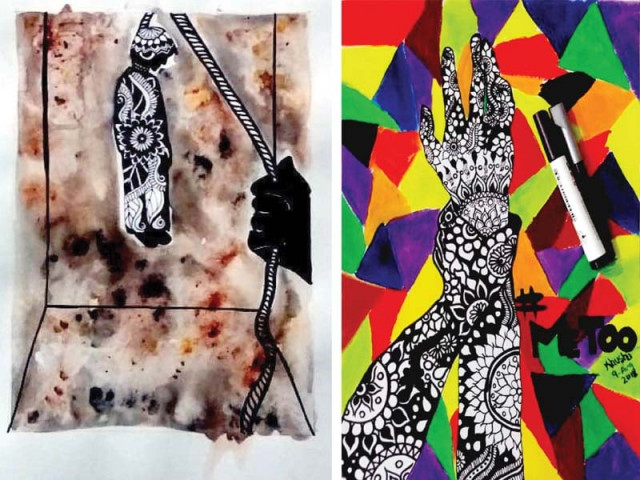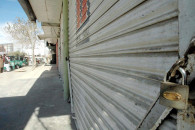Sensitising society towards sexual violence in 10 days
NCA student Khushbakht Islam produces 10 portraits depicting various forms of harassment, it's effects

Works by Khushbakht Islam. PHOTO: COURTESY KHUSHBAKHT ISLAM
A budding young artist from Karachi, Khushbakht Islam, studying at the National College of Arts in Lahore, has challenged herself to produce 10 pieces depicting various forms of harassment and its after effects in 10 days.
A stark increase in the number of reported harassment, rape, child abuse and pedophilia cases is the motivation behind this 10-day challenge. Islam has made use of mandalas [circles] and colour in her artwork.
"Mandalas were used for healing in ancient Buddhist history," shared Islam.
Man attempts to rape 11-year-old in Lahore
By linking these mandalas to horrific depictions of harassment, Islam aims to restore the critical thinking process she deems important for the resolution of the issue.
"The colours represent hope and the mandalas represent healing. The images are outrageous and provocative, but anger and frustration over the issue won't help in seeking its resolution," Islam said.
In her 10-day challenge, Islam has created a different portrait each day which is linked to harassment, its perpetrators or the psychological impact of it.
The portraits follow a chronological order. Starting with the depiction of common forms of harassment, such as groping and unwanted sexual advances, Islam moves onto graver forms of sexual violence, such as kidnapping, sexual assault and torture and ends the 10-day challenge with the depiction of the effects of sexual violence, such as the end of life, social life or succumbing to victimisation.
One of the pieces, 'Your Very Own', demonstrates that in most of the sexual harassment and child abuse cases, relatives, close friends or the most-trusted people are the ones involved.
Another image, 'Dead', reflects on how victims gradually move towards death. It highlights that in most cases, the psychological trauma of an incident leads towards paralysis of one's social, academic and personal life. The victim no longer remains a living being, but a breathing body.

'Bestiality' and some other images represent instances of brutality, such as the cuffing of feet, uninvited advances, such as touching body parts, caging or tying up the victim.
According to an estimated analysis, around 70% of women and girls encounter physical or sexual violence and about 93% experience sexual harassment at public places. This data, as suggested by Madadgar National Helpline 1098, is just "the tip of the iceberg".
Another piece, 'You laid your hands on me', encompasses the trauma of an unknown and unwelcome touch. It aims to highlight how such a touch slides in from nowhere to the private parts of a person's body, violating the sanctity of personal space.
"Giving children sex education from an early age is the only solution which can contribute somewhat to resolving these issues," believed Islam.
She commented that the segregation of boys and girls in educational institutions or the silence of parents on topics such as sex education for children won't do any good. Instead, such a culture can aggravate the problem, she said.
The artist said that victim shaming, not reporting cases to the police and lowering the morale of a victim by imposing restrictions are some of the measures adopted by a large section of society towards victims of sexual violence.
These measures push the victim towards dark dungeons of despair, from where starting a new life becomes seemingly impossible or tedious.
Cases such as that of Khadija Siddiqui, a law student who was stabbed 23 times by her class fellow in 2016, exemplify the loopholes in the judicial system when it comes to cases of sexual violence. Instances where the perpetrator roams freely affirms society's apologetic attitude towards such incidences.
Police allegedly sell girl who accused them of raping her
"To highlight such issues, art is a wonderful medium which, with its defined strokes and burst of colours, depicts horrible realities in a comprehensible way," shared Islam.
Referring to how hype over the Zainab rape and murder, Kasur child pornography and other cases of sexual violence and harassment dies down a day or two after making it to the mainstream media, Islam said, "People become furious, hold protests and plan discussions, but something new catches their attention after a week and they forget."
She agreed that change is gradual, but urged that a constant effort is needed to make positive change.



















COMMENTS
Comments are moderated and generally will be posted if they are on-topic and not abusive.
For more information, please see our Comments FAQ